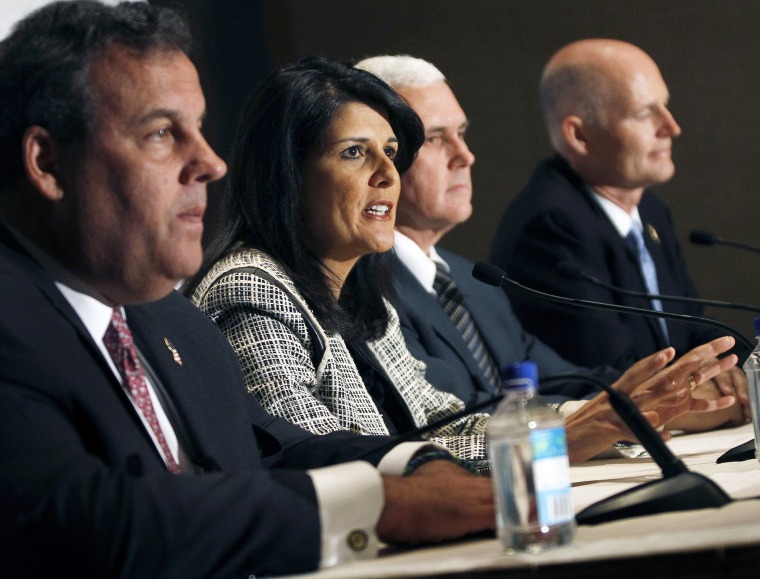Republican governors plan to run against Washington in 2014 and run hard.
As members made clear at their annual Republican Governors Association meeting in Arizona, the organization's plan is to make the contrast between their incumbents' achievements and Congress' stagnation their top selling point. The move means they'll be effectively running against their own party--or at least segments of it.
"I'm criticizing everybody," New Jersey Governor Chris Christie, the RGA's new chairman, said at a press conference Thursday. "The fact is that these folks have a responsibility to run the government, that's what they were sent there to do, and to try to solve problems that are national problems. I think that the frustration that many of us feel is that they're a headwind rather than a tailwind and that's not productive for the citizens that we're all privileged to represent."
Christie was joined by several fellow governors who echoed his "pox on both their houses" rhetoric throughout the brief event.
“There’s no saints in Washington right now," South Carolina Governor Nikki Haley said. "Republicans and Democrats have royally screwed this up."
"The only thing we see exported out of DC is insanity," Florida governor Rick Scott added.
Even Indiana's Mike Pence, who previously held a leadership role in the House, sounded off.
"Comparing my 12 years on Capitol Hill and my 12 months since being elected, I'm more convinced than ever that the cure for what ails this nation will come more from our nation's state capitals than it ever will from our nation's capital," he said.
Of course, it's as easy as it is politically smart to bash Congress for failing to pass major legislation. Less clear is reaching consensus on why they keep failing. After all, the 90% or so of Americans who disapprove of Congress are mad for completely different reasons: some want Republicans to gum things up even more, others want Democrats to take a tougher line, some on each side would like more compromise from their own party.
The GOP governors at the table represented a range of ideological and political styles tailored to their various states and their records reproduce some of the same internal conflicts that have ground Congress to a halt.
Christie has accepted Obamacare's Medicaid expansion, for example, while Haley, whose state's Congressional caucus is a tea party hotbed, has taken a no-holds-barred approach against the law that reflects her more conservative constituency.
When asked about immigration, another issue where internal divisions have led to gridlock, Haley praised her state's hardline laws aimed at curbing illegal immigration. Christie, whose rhetoric has been softer on the issue, blamed Congress for failing to reach unspecified reforms. But he declined to respond to a question about whether he supported a path to citizenship for undocumented immigrants.
"I don't have to answer the question the way you want me to," he said.
